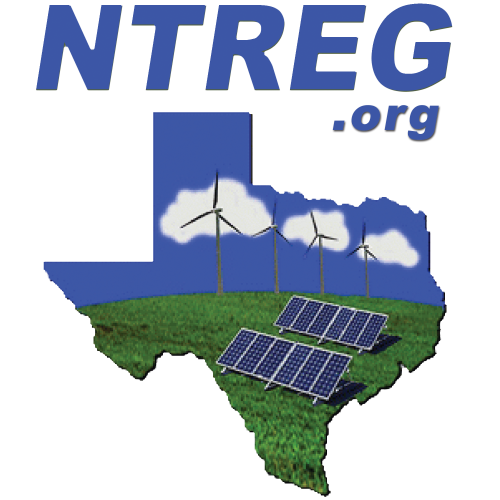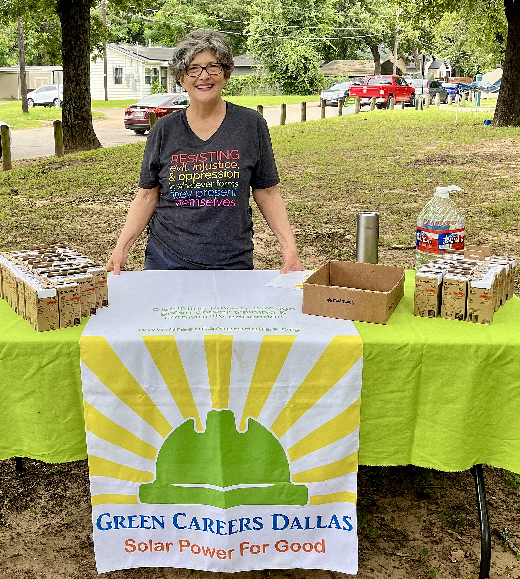Welcome to the North Texas Renewable Energy Group
NTREG Upcoming Events
On this page:
-
Upcoming Meetings - Saturday, June 14, 2025 & July 12, 2025 (July posted early)
-
Future Meetings
- Other Events around Texas and the USA
NTREG's June & July Meetings (July posted early)
Date: Saturday, June 14, 2025
Time: 10:00 am - 12:00 noon
Location: Dallas College North Lake Campus, Building 'C', Room C-243
and virtual online via ZOOM.
Address: 5001 North MacArthur Boulevard, Irving, Texas
Click HERE for a map to the Dallas College North Lake Campus. (Opens new window.)
Click HERE for a map of the Dallas College North Lake Campus. (Opens new window.)
Click HERE for a parking map and meeting location on the campus. (Opens new window.)
Click HERE for a full campus map. Click the "Interactive Campus Map" button for the location of Building 'G'.
If you prefer to attend online, here is the access information:
Click HERE to Join our June 14 meeting online.
Direct Link:
https://us02web.zoom.us/j/85744949803?pwd=xo2ZGgnop1jOKca1JHVLt2cYObfhI0.1
Meeting ID: 857 4494 9803 Passcode: 742521
One tap mobile: +13462487799,,85744949803#,,,,*742521# US (Houston)
Dial by your location: +1 346 248 7799 US (Houston)
Meeting ID: 857 4494 9803 Passcode: 742521
Presentation: "Resilient Homebuilding Strategies"
Presenter: Alan Hoffmann, founder of Hoffmann Homes
About Our Presenter:
Alan Hoffmann is the founder of Hoffmann Homes, a sustainable builder of single-family homes. He holds the professional designations from the National Association of Homebuilders of Certified Graduate Builder (CGB) and Certified Green Professional (CGP).
In April, Alan had the great distinction and honor of being invited to take part in the MIT Concrete Sustainability Hub Resilience Executive Roundtable in Boston - a gathering of leading minds exploring how to build smarter, stronger and more sustainably. They were discussing the insurance crisis and policies and strategies to deal with the huge financial consequences of the meteorological events happening around the world. One powerful takeaway? For every $1 invested in resilience, we can save up to $13 in future damage from weather events.
About Our Presentation:
Changing weather patterns are devastating communities around the nation and in Texas through flooding, drought, wildfires and stronger tornadoes and hurricanes. Texas is the second-leading state in total costs since 1980 (~$436 billion). As a result, Texas has the second highest Hazard Insurance rates in the country.
Our June 14 presentation will address:
- What are strategies we can use to help manage these safety issues and risks for homeowners and communities?
- How can we help mitigate this expanded exposure for insurers and homeowners?
- What role will solar and battery backup systems play in building resilience?
... and related topics.
NTREG's June & July Meetings (July posted early)
Date: Saturday, July 12, 2025
Time: 10:00 am - 12:00 noon
Location: Dallas College North Lake Campus, Building 'C', Room C-243
and virtual online via ZOOM.
Address: 5001 North MacArthur Boulevard, Irving, Texas
Click HERE for a map to the Dallas College North Lake Campus. (Opens new window.)
Click HERE for a map of the Dallas College North Lake Campus. (Opens new window.)
Click HERE for a parking map and meeting location on the campus. (Opens new window.)
Click HERE for a full campus map. Click the "Interactive Campus Map" button for the location of Building 'G'.
If you prefer to attend online, here is the access information:
Click HERE to Join our July 12 meeting online.
Direct Link:
https://us02web.zoom.us/j/86838647512?pwd=4cthFsbPMcejEwUBI3UaNyQFa4Af6d.1
Meeting ID: 868 3864 7512 Passcode: 968797
One tap mobile: 13462487799,,86838647512#,,,,*968797# US (Houston)
Dial by your location: +1 346 248 7799 US (Houston)
Meeting ID: 868 3864 7512 Passcode: 968797
Presentation: "The Good, The Bad, and The Ugly of the 89th Texas Legislative Session"
Presenter: Rita Beving of Public Citizen (in person at the College)
About Our Presenter:
Rita Beving has a thirty-year history of advocating for citizens on environmental issues. She currently works with the national nonprofit Public Citizen. Rita has also worked professionally and as a volunteer for both the Sierra Club and Clean Water Fund. Rita serves on the Dallas Environmental Commission as a technical advisor. Previously, she was the Vice Chair of the Environmental Task Force that served as the interim committee on the Dallas Comprehensive Environmental and Climate Action Plan (CECAP).
Rita has lobbied at the State Capitol and Congress both as a volunteer and a registered lobbyist since 2000 on a variety of environmental and energy issues.
In Texas, Rita has worked on a variety of environmental issues statewide including those addressing issues on the permitting of the Keystone XL and TransPecos pipelines, land farms, landfills, cement kilns, concrete batch plants, and also worked with former Dallas Mayor Laura Miller regarding the denial of permits for more than a dozen coal plants statewide.
About Our Presentation:
Rita will discuss a range of bills that were offered during the 89th Texas Legislature focusing on environmental and energy legislation. She will discuss bills that were both good and bad, those that passed, and those that failed that may or would result in major impacts to the issues we care about. For special interest, she will talk about some of the most unusual bills offered .. and where they landed at the end of session.
Secondary short topic: "Under the Sun: The Effect of an Air Gap on Internal House Temperature and PV Panel Efficiency" (in person by high school student Nidhi Ajmera - her science fair project)
Directions to North Lake Dallas College, 5001 North MacArthur Boulevard, Irving, TX 75038:
Via the Walnut Hill Lane main entrance:
Enter on North Lake College Boulevard at the west side of the campus. Turn right at the stop sign into a parking lot. Building C will be directly ahead when you're at the stop sign, on the southwest side of Liberty Circle (with the flagpoles). Building 'G' will be on your left. There is handicap parking close to the entry doors of Building 'G'. This is also the nearest handicap parking for Building 'C'.
Via the MacArthur Boulevard east entrance:
From Interstate 635 or Highway 114, take MacArthur Boulevard southward.
From Interstate 30 or Highway 183, take MacArthur Boulevard northward.
The North Lake campus entrance is a short distance south of the DART Orange light rail line overpass across MacArthur Boulevard. Don't enter the light rail stop! Follow the main road to the left. At the stop sign, turn right and follow that road to the next stop sign. Liberty Circle (with the flagpoles) will be on your left, and Building C will be ahead. Continue ahead into the lot in front of Building C. Handicap parking is along the northeast side of the parking lot in front of Building 'G'.
See the campus map showing Building G.
Click HERE for a full campus map. Click "Interactive Campus Map" for the location of Building 'G'.
Our meeting starts at 10:00 a.m., but feel free to arrive a bit early and socialize!
Upcoming Meetings (Tentative - Subject to Change)
June 14: "Resilient Homebuilding Strategies". Presenter: Alan Hoffmann, CEO of Hoffmann Homes
July 12: "The Good, The Bad, and The Ugly of the 89th Texas Legislative Session". Presenter: Rita Beving of Public Citizen.
Special Second Presentation: Effect of air gap on PV panel efficiency. Presenter: Nidhi Ajmera (her science fair project.). North Lake College, Building 'G', Room G-401
August 9: To Be Announced. Presenter: To Be Announced. North Lake College room G-401
September 13: To Be Announced. Presenter: To Be Announced. North Lake College room G-401
October 11: To Be Announced. Presenter: To Be Announced. North Lake College room G-401
November 8: To Be Announced. Presenter: To Be Announced. North Lake College room G-401
December 13: To Be Announced. Presenter: To Be Announced. North Lake College room G-401
Renewable Energy Events from Around Texas, the USA, and the World.
Join NTREG's Conversation Group!
You'll receive a confirming e-mail from Groups.io. Click the link you receive in the message to confirm your e-mail. That's all you need to do!
As always, your personal information is totally confidential. NTREG does not sell, share, or distribute your information in any manner.
You need not be a member of NTREG to participate in our Conversation Group.


